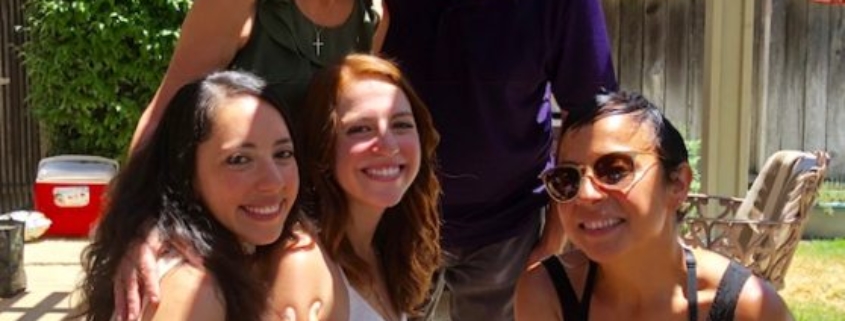Identity
Two years ago, I was talking to my roommate, who is Mexican American, when I realized how much I felt like an outsider. She had just come back from a lawyer group in San Diego for women of color. As we talked about it, I started to get nervous, anxious. A thought kept floating through me. I had kept this thought so tightly buried, but it often came to the forefront of my mind. I didn’t know who I could talk to about it, but I knew I couldn’t live with it hidden inside of me much longer. It was eating me alive from the inside.
There was a lull in our conversation, and I let this thought, which had been on my mind for most of my life but I was always too afraid and ashamed to say, escape:
“Am I a woman of color?”
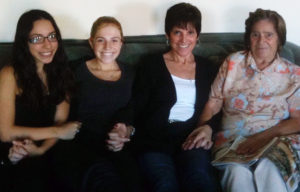
Three Generations of My Family
What most people don’t know about me is that I’m 100 percent Puerto Rican, second generation born in the United States. My mom and dad are both Puerto Rican, born in New York. My grandparents were born, raised, and lived most their lives in Puerto Rico. After my eldest uncle was born, my grandpa, Papá, decided to come to the United States to be a migrant farmworker, while my grandma, Mita, stayed in Puerto Rico to take care of my uncle until my Papá had enough money to bring Mita and my uncle to the States. That story is a whole other interesting caveat in and of itself. But the point I’m trying to make is that there’s no doubt in my mind that I’m Puerto Rican. Well, there shouldn’t be.
Yet sometimes, I don’t feel very Puerto Rican.
I wasn’t taught Spanish when I was a kid, although it was my parents’ first language. I learned it laboriously when I was an adult while I was studying and working in Argentina. Every few years, when I was growing up, my family would go to Puerto Rico to visit family, but I wouldn’t be able to communicate with most of them. This disconnection from my culture and my extended family has always made me feel separated from my Puerto Rican roots.
I don’t blame my parents for this at all. I understand that they simply assimilated into American culture. Even though my parents might not have realized, this notion was passed down from my grandparents. It was necessary for my grandparents to learn English and be a part of the American culture. For them, this was survival. However, two generations later, I wanted nothing more than to speak Spanish and hold onto my Puerto Rican roots.
I studied Spanish in college and decided to study abroad in Argentina to try to become fluent in my family’s language. When I was studying abroad, I met a Colombian guy. We grew close and eventually started dating. I still remember the first time we met. My Spanish was slim to non-existent, and I was still getting my bearings in a new country.
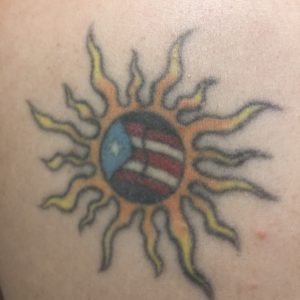
He and I were out at a bar with a group of friends—friends who I had just met two days prior when I arrived to Argentina. He was trying to talk to me with his minimal English, and I was trying to communicate with my broken Spanish. I proudly told him, “Soy puertorriqueña.” He shook his head and told me that I was wrong. I wasn’t Puerto Rican. I showed him my tattoo, a family tattoo that I had gotten when I turned 18. It’s a Puerto Rican flag waving inside of a sun and a tattoo that most of the women in my family have gotten. He still denied it, denied that I was Puerto Rican, denied my identity.
What was it about me that wasn’t Puerto Rican? Did I not act like a Puerto Rican? Did I not look like a Puerto Rican?
I didn’t realize it then, but something in me broke that day. A doubt was wedged into my mind. I began questioning who I was. Was I really Puerto Rican if I didn’t speak Spanish and I didn’t look the part?
A joke I’ve heard many times from people outside my family is “was it the milkman?” My family all has lighter skin, but no one has red hair like I do. Because I didn’t look Puerto Rican enough to many people, I was the other, someone who didn’t quite belong to my family. An imposter.
This tore me apart inside. And the question of who I was stayed hidden in my subconscious for years.
I ended up dating the guy I met in Argentina for 7 years, and he constantly denied my Puerto Rican identity. Even after I learned Spanish and became fluent, even after I took him to Puerto Rico and he met all my family still living there, he still considered my non-authentic Spanish and my light skin and red hair proof that I wasn’t Puerto Rican. I argued with him constantly trying to prove myself to be a true Latina, but I started to believe him.
When we broke up and that constant denial of who I was disappeared, I still didn’t feel Puerto Rican. By that time, my identity had been striped away from me day-by-day and the damage that he had done left scars that were not easily erased. The problem was I didn’t feel a part of the American society I was living in either. I didn’t know where I belonged.
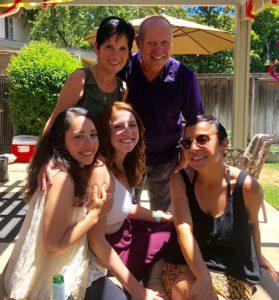
From a young age, I knew I was different than many of my white American friends. My family was the biggest reminder of this. We are loud, crazy, and love each other with a passion. There isn’t a family get-together that doesn’t involve dancing salsa and eating arroz con gandules. We are each other’s best friends and will do anything for each other. I could see the difference when I went over to my friends’ houses as a kid. They didn’t have close relationships with their parents or siblings like I did. Family dinners, if they even happened, were quiet with barely any words spoken between the family. I can’t remember a family dinner that was quiet or subdued. They would disrespect their parents by saying they hated them or telling them to shut up. I couldn’t even fathom doing this with my family.
I knew I was different. So then where do I fit in?
* * *
Race is such a difficult topic to talk about today. I know I’m Puerto Rican, but I look white. Visiting Puerto Rico, this isn’t an anomaly. Puerto Rican people are a mixture of the Taíno indigenous people, the Spaniards who colonized them, and Africans. This means, Puerto Ricans can have all different color skin. However, people in the United States don’t usually identify a light-skinned person as Latinx.
The fact is I have white skin and red hair, and because of that, I benefit from many of the advantages of white privilege. So, can I really call myself a woman of color? Doing so feels like I’m taking something away from women who struggle every day because of the color of their skin, women who don’t have the opportunities and privileges I have because of the color of my skin, women who fear for their lives because of the color of their skin.
Again, I’m stuck in no-man’s land. Not quite white, not quite a woman of color.
My roommate two years ago gave me back something that I didn’t even realize I was missing when she said, “Of course you’re a woman of color.” To her, I will be forever grateful. She gave me some agency back. She gave me a little piece of my identity back. The identity that had been stripped away from me slowly over the years.
Even with her affirmation, I still don’t quite believe it. There’s a battle raging inside of me. I don’t feel right identifying as a woman of color or joining a woman of color group like my roommate did. I am still finding my identity and working on being comfortable with who I am.
There are a few things I do know:
- I am Puerto Rican. Nothing anyone says will take that away from me.
- I am American.
- I am a writer.
Nothing in this list takes preference over the others; they are all equally me. They are all equally part of my identity.
The rest of it I’m still figuring out. However, without writing, I would not have come as far as I have. Writing has been an outlet for me, a way to voice these thoughts without judgement and shame.
I know, without the support, love, and acceptance from my family, my friends, and my writing community these doubts would have stayed buried in my head, torturing me.
* * *
I find a little solace in knowing that I’m not alone in this. I’ve talked to many people who struggle with being a light-skinned Latinx. To those people I’d say: don’t let people tell you who you are. Be proud of your culture, your identity. Don’t let anyone take that away from you.
I will continue to try to follow my own advice and be proud of who I am.
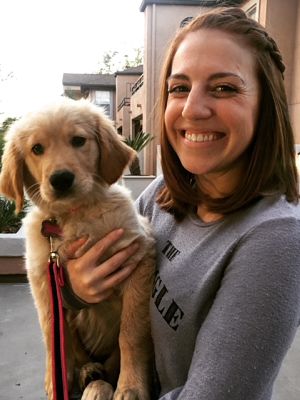 Kristina Ortiz is an elementary school teacher and MFA candidate at Antioch University Los Angeles, where she is the associate managing editor and web team manager for the literary journal Lunch Ticket. She lives in Ventura County, California with her fiancé, golden retriever Bella, and cat Lara.
Kristina Ortiz is an elementary school teacher and MFA candidate at Antioch University Los Angeles, where she is the associate managing editor and web team manager for the literary journal Lunch Ticket. She lives in Ventura County, California with her fiancé, golden retriever Bella, and cat Lara.

